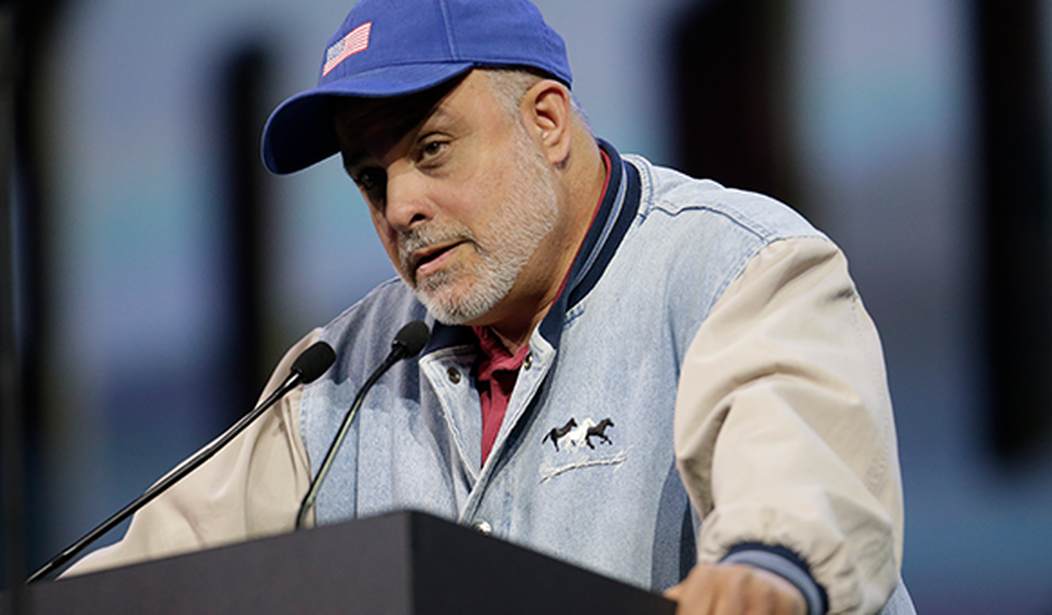After former President Donald Trump was convicted by a judge and jury on 34 felonies Thursday afternoon, which were resurrected from misdemeanors past the statutes of limitations and upgraded as charges by Manhattan District Attorney Alvin Bragg, constitutional law attorney and conservative radio host Mark Levin has some advice about what to do next.
Levin is urging Trump to get the case out of New York and to the Supreme Court as soon as possible. From a post on X:
The issue is how to get out of the New York system and bring the case to the Supreme Court, which may or may not take it up. That is why I look to Bush v Gore, where the S Ct decided to step in BECAUSE it was a presidential election. There was another court involved, the Florida Supreme Court. And it was that court that the Supreme Court believed was violating the Equal Protection Clause. That was the doctrine it settled on, given the unequal treatment of voters.
In New York, you would file the notice of appeal, ask for a stay of the trial court, and seek expedited review. You need to protect your ability to timely appeal and not abandon it. You might then file applications for common law writs with the US Supreme Court, where the S Ct can take action if it chooses, and legitimately claim the harm is immediate and ongoing not just to a presidential candidate, but to the federal electoral system, federal campaign jurisdiction (reverse federalism), and the precedent that might otherwise be set and spread throughout the country. The denial of due process infected every aspect of the case.
The S Ct has common law powers (common law writs -- judicially created not statutorily created) it uses very sparingly, in extraordinary circumstances, to grant relief. Waiting would compound the problem. The problem now is that every day that goes by, the actions by the NY lower court bleeds into the federal, presidential election system.
Where does this end? Will other DA's use the Bragg-Merchan precedent, such as it is, going forward, and not care what higher state courts have to say, in that those courts may not act quickly or at all. So, now local prosecutors and state judges will intervene in presidential elections or any federal election.
We need to give the Supreme Court the opportunity to intervene. If it chooses not to, then it won't.
But between Jack Smith criminalizing election challenges to the point that we do not know what is or is not legal, and now Bragg and Merchan criminalizing events and activities that are not illegal, to the point we don't now know what they are, the Supreme Court, in my view, must do something.
In the end, the S Ct will not be able to avoid this forever. Better to deal with now than later, when it will get worse.
Recommended
.@marklevinshow: No crime. No jurisdiction. No due process. Conflicted judge. Soros prosecutor. Manhattan jury. pic.twitter.com/bhblC06CYF
— Trump War Room (@TrumpWarRoom) May 31, 2024
Before the verdict, Levin offered this advice:
MY LEGAL ADVICE TO PRESIDENT TRUMP'S ATTORNEYS: NEXT STEP U.S. SUPREME COURT
In Bush v. Gore, the United States Supreme Court interceded in the Florida Supreme Court's deliberations because that Court was changing the Florida voting system on the fly, thereby violating the EQUAL PROTECTION rights of the Florida voters; that is, the state court was establishing new standards for resolving a presidential election.
The Manhattan trial court has done worse. It has taken up a case in which there is exclusive FEDERAL JURISDICTION (involving the Federal Election Campaign Act) despite the fact that the federal agencies with authority over enforcing federal campaign laws, the Federal Election Commission and the Southern District of New York/U.S. attorney's office, declined to bring charges; where the judge is conflicted (his daughter is raising tens of millions of dollars on behalf of her Democrat Party clients); where collateral evidence has been abundant (and has no probative value); where the elements of the supposed federal offense were never articulated by the state or the Court; the imposition of a gag order on the defendant who is the future Republican nominee for president in the midst of the federal campaign for president; and so forth. Moreover, this state court could have easily avoided influencing and interfering with the federal presidential election merely by setting a later time for the case, if the court actually believed it somehow had merit. After all, the state waited years to bring its case.
Therefore, there is not only a federal constitutional equal protection violation, in that this state trial court has purposefully interposed itself into the federal presidential election without authority or jurisdiction but has also violated the federal constitutionally protected due process rights of the future Republican nominee for president. Furthermore, the voters are to determine the federal election outcome without the interference of a state court attempting to influence the result.
If President Trump is found guilty of any of the thirty-four charges, I would strongly encourage his attorneys to seek an emergency appeal to the U.S. Supreme Court based, at least in significant part, on Bush v. Gore.
Bush v. Gore, 531 U.S. 98, 103 (2000)
Outside the courthouse Thursday afternoon, former President Trump vowed to appeal the verdict.
DONALD TRUMP: "This is a rigged disgraceful trial. The real verdict is going to be November 5th by the people...
— Townhall.com (@townhallcom) May 30, 2024
I’m a very innocent man. It’s okay. I’m fighting for our country, I’m fighting for our constitution...
And we’ll keep fighting. We’ll fight to the end and we’ll win.… pic.twitter.com/tVNPotOLl4

























Join the conversation as a VIP Member